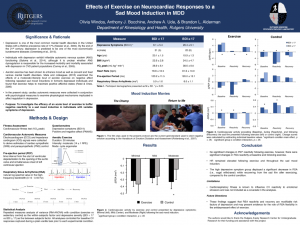Windos, Olivia: Effects of Exercise on Neurocardiac Responses to a Sad Mood Induction
Title: Effects of Exercise on Neurocardiac Responses to a Sad Mood Induction
Name: Olivia Windows
Major: Exercise Science
School affiliation: School of Arts and Sciences
Programs: Aresty – Research or Conference Funding Recipient
Other contributors: Brandon Alderman, Anthony Bocchine, & Andrew Ude
Abstract: Does an acute bout of aerobic exercise alter reactivity to a sad mood induction in clinically
depressed individuals? A study of responders and non-responders.
Major depressive disorder (MDD) is a debilitating mental health condition that presents a major public health burden. Respiratory sinus arrhythmia (RSA) reactivity has been proposed as an index of impaired emotion and self-regulation in depression. Acute exercise has consistently been shown to improve affect, but it is unknown whether exercise affects RSA reactivity to emotional challenge. In addition, previous studies have not addressed nonresponse to sad emotion inductions, which limits understanding of important individual differences in affective processing. Purpose: To characterize responders and non-responders to the sad mood paradigm and whether acute exercise impacts emotional responding to the emotion induction paradigm. Methods: Using a within-subjects design, young adults diagnosed with MDD completed a 30-min exercise and sedentary control session in counterbalanced order on two separate days. Following a recovery period, RSA reactivity was assessed using electrocardiography (ECG) during a 3-min sad mood induction. The Positive and Negative Affect Scale (PANAS) was used to assess affective responses throughout each session and sadness to the mood induction was assessed on a 9-point Likert scale. Results: There were significantly more responders than non- responders to the mood induction following the exercise condition, p < .05. Conclusions: These findings indicate that acute aerobic exercise may be an effective approach to increase emotional regulation and behavioral flexibility in clinically depressed individuals. Future research should continue to examine individual differences in emotional responding as well as investigating who
will successfully respond to exercise treatment.
Keywords: aerobic exercise, depression, heart rate variability, emotional reactivity
